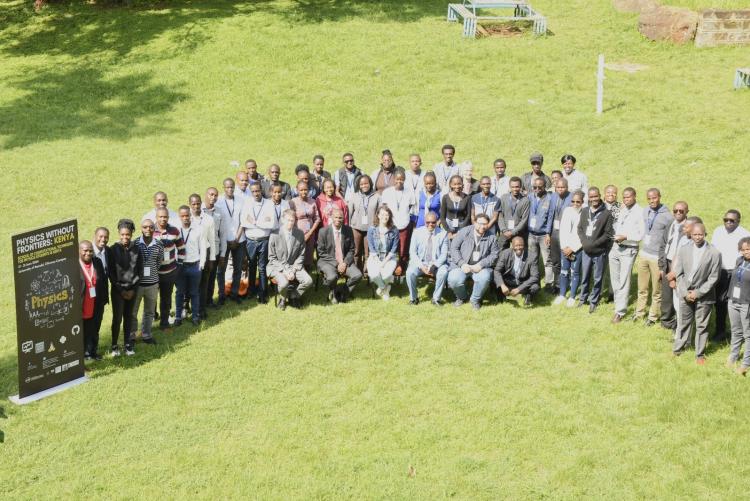The University of Nairobi's Chiromo campus recently hosted the inaugural School of Computational Techniques for Physics Students in Kenya (SCoTeP-K) from June 17-21, 2024. This landmark event, a collaborative effort between the Department of Physics and the Department of Computer Science, was designed to equip Kenyan physics students with advanced computing skills to bolster research in key national priority areas of science, technology, and innovation.
The event was supported by several notable sponsors, including the French Embassy in Kenya and Somalia, the University Paris-Saclay, the Kenya Education Network, and the Physics Without Frontiers program of ICTP. The workshop represented a significant step forward in advancing scientific education and research capabilities in Kenya.
Out of over 160 applicants, nearly 40 physics students from 18 universities across Kenya were selected, with almost 40% being female students. This diverse group included both undergraduate and postgraduate students. The intensive five-day program was delivered by a team of distinguished Kenyan and international physicists and computer scientists, including experts from France and Italy.
Dr. Ian Kaniu, senior lecturer at UoN's Department of Physics and the program coordinator, introduced the unique, intensive workshop designed to enhance computing skills in physics. He highlighted the program's focus on practical applications and hands-on experience in areas such as Linux, Python programming, statistical data analysis, and machine learning. Dr. Kaniu emphasized the comprehensive learning experience offered by the workshop, featuring real-world physics examples and opportunities for networking and professional growth.
Prof. Nyongesa, Chair of the Department of Physics at the University of Nairobi, welcomed the participants and expressed his delight in hosting nearly 40 talented students from 18 universities. He extended heartfelt gratitude to the sponsors and partners, acknowledging their crucial support. Prof. Nyongesa emphasized that SCoTeP-K was a significant step forward in equipping physics students with essential computing skills, bridging the gap between theoretical physics and practical computational techniques, and laying the foundation for Kenya's future scientific advancements.
The curriculum covered a wide range of computational techniques essential for modern physics research. Participants began with an introduction to the Linux operating system, delivered by Dr. Livingstone Ochillo from Jaramogi Oginga Odinga University of Science and Technology. The program then delved into the Python programming language, equipping students with a versatile tool for scientific computing and data analysis. Statistical analysis, led by Dr. Christina Agapopoulou from the French National Centre for Scientific Research (CNRS), formed a significant component of the program, enhancing students' ability to interpret and analyze experimental data.
A major highlight of SCoTeP-K was the introduction to machine learning, spread across five sessions led by Dr. Lorenzo Capriotti from the Italian National Institute for Nuclear Physics (INFN). These sessions covered fundamental concepts, algorithms, and practical applications of machine learning in physics research. The program also included an introductory course on Git versioning, teaching students essential skills in code management and collaborative software development.
Throughout the school, practical application was emphasized, with examples drawn from nuclear and particle physics. A special session on computing techniques in laser physics and spectroscopy research at the University of Nairobi, presented by Dr. Ian Kaniu, further illustrated the practical applications of these skills. The school also featured a virtual visit to the LHCb experiment at CERN and a career and opportunities session offering insights into further studies and career paths in academia and industry.
Prof. Kiboi, Acting Dean of the Faculty of Science & Technology, welcomed participants to Chiromo Campus. He emphasized the evolution of physics to modern computational approaches and the multidisciplinary nature of the field. Prof. Kiboi underscored the role of universities in generating new knowledge and innovations and encouraged participants to maximize their learning and networking opportunities.
Prof. Meoli Kashorda, Executive Director of the Kenya Education Network (KENET), highlighted the organization's commitment to advancing computational research and education. He announced the launch of KENET's first GPU cluster for data-intensive research, setting an ambitious goal of increasing Kenya's research productivity tenfold in the next three years.
Mathieu Guérin, Ambassador for Science and Higher Education at the French Embassy, emphasized the growing scientific cooperation between France and Kenya. He outlined priority areas for collaboration and noted ongoing projects, including the Engineering Science Complex project at the University of Nairobi.
During the Careers and Opportunities session, Kate Shaw from ICTP highlighted various opportunities for Kenyan physics students, including MSc and PhD programs at ICTP and other institutions. She provided valuable advice on the application process and mentioned opportunities from TWAS and OWSD.
Participants like Boniface Onyango Richard Ochieng', an MSc Computational Physics student from Maseno University, found the workshop exceeded expectations. Boniface valued the Linux and statistical analysis sessions for their direct applicability to his research and plans to apply the acquired skills to improve his work.
SCoTeP-K concluded with a closing ceremony where students received certificates, marking their successful participation in this intensive program. The event provided valuable skills and laid the groundwork for ongoing collaboration and the integration of computational techniques into future physics curricula across Kenyan universities.
The success of SCoTeP-K was a result of the collaborative efforts of Dr. Ian Kaniu from the University of Nairobi, Lydia Roos from the CNRS, Dr. Jeremiah Kebwaro from Karatina University, Dr. James Mugambi from South Eastern Kenya University (SEKU), and Dr. Dimitris Varouchas from CNRS and Université Paris-Saclay, supported by teaching assistants Charles Ndegwa and Tarus Kiplabat from the University of Nairobi.
- Log in to post comments

